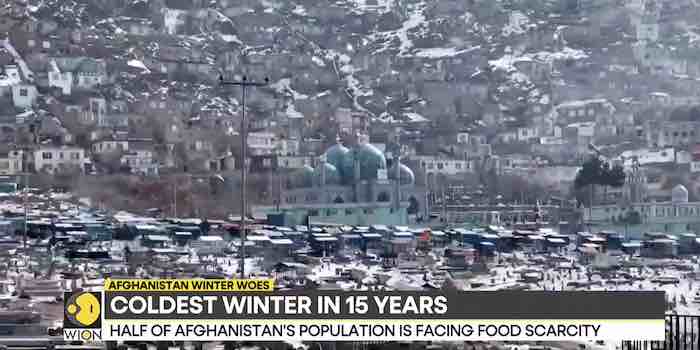By Joseph A. Klein, CFP United Nations Columnist ——Bio and Archives--February 4, 2023
World News | CFP Comments | Reader Friendly | Subscribe | Email Us

Since the Taliban took the reins of power in Afghanistan following President Biden’s disastrous withdrawal of all American troops from the country in August 2021, conditions in Afghanistan have gone from bad to worse. The bottom is dropping out of the country as a catastrophic humanitarian crisis has taken hold. About two-thirds of the population, some 28 million people, are dependent on humanitarian aid but are not getting what they need. Six million Afghans are now on the brink of starvation.
The Taliban is turning the clock back to more primitive times by banning women and girls from the workplace, secondary schools, and higher education. The Taliban is also not allowing Afghan women to work with non-governmental organizations (NGOs) on the ground to deliver much needed aid to desperate Afghan adults and children, except to some extent in the areas of healthcare and nutrition.
Senior United Nations leaders have raised their concerns with the Taliban authorities who are running Afghanistan’s de facto government, but to no avail.
UN Deputy Secretary-General Amina Mohammed spoke to reporters at UN headquarters on January 25th following her trip to Afghanistan. The bottom line is that Ms. Mohammed, who herself is a Muslim, got nowhere in her efforts to obtain a definitive commitment from the Taliban authorities that they would reverse their bans within a specified timeline. All they would provide were vague statements to the effect that something would be done “soon.”
“I probably pushed a little far,” Ms. Mohammed said, “because the reactions I got were to remind me that it was even... they were doing me a favour, it was haram for me to be there talking to them.”
Ms. Mohammed noted the Taliban’s complaints that they had not received enough credit from the international community for the positive steps they have taken on such matters as corruption and poppy production. They want Afghanistan to be represented at the UN by one of their own, who would receive the appropriate UN member credentials, rather than to continue being represented by someone affiliated with the former government. The Taliban want all the symbols of international recognition as the legitimate governing authority of Afghanistan.
“Recognition is one leverage that we have and we should hold on to it,” the UN Deputy Secretary-General remarked. “I want to look for the light in this darkness, and it's pretty dark,” she added. “But there are some lights you know, specks of light that we can grab and we can try to light out the darkness.”
Martin Griffiths, UN humanitarian relief chief and chair of the Inter-Agency Standing Committee (IACS) who visited Afghanistan and met with Taliban authorities in recent days, spoke with reporters on January 30th along with other IACS members. “Our view is that the message has clearly been delivered: that women are central, essential workers in the humanitarian sector, in addition to having rights, and we need to see them back to work,” Mr. Griffiths said at the press briefing.
Women have comprised 30 percent of the 55,000 Afghan nationals working for NGOs in Afghanistan, according to Janti Soeripto, President and Chief Executive Officer of Save the Children. “Without women on our teams, we cannot provide humanitarian services to millions of children and women,” she said. Innocent lives are at stake.
The IACS representatives were told by Taliban authorities that the bans may be loosened once certain “guidelines” are completed. What these “guidelines” consist of and when they will be completed the Taliban would not say.
Mr. Griffiths said that it would be counterproductive to pressure the Taliban to immediately reverse their bans. He urged patience.
Sadly, however, the millions of Afghans who are on the verge of starvation or freezing to death during the brutal winter in Afghanistan cannot afford to wait. Their very lives are on the line while the Taliban remains stuck in the 13th century and the UN dithers.
View Comments
Joseph A. Klein is the author of Global Deception: The UN’s Stealth Assault on America’s Freedom.